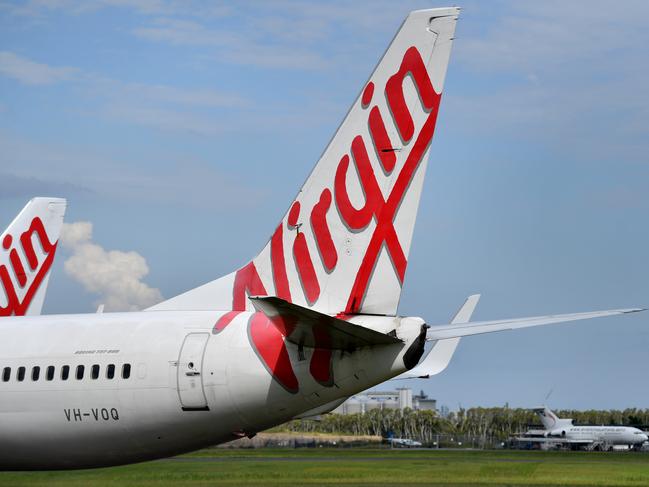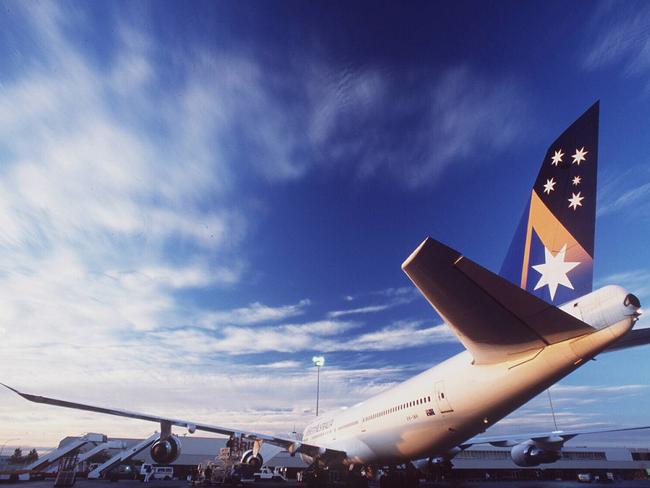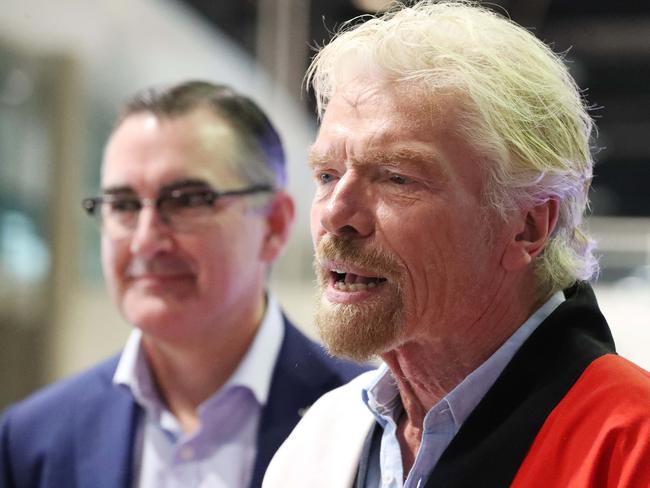Terry McCrann: Virgin is dead no matter how much money you throw at it
Sure, the administrators now in control at Virgin say they want to save the airline. There’s just one problem. Like Ansett in 2001, Virgin as we know it can’t be saved, writes Terry McCrann. Here’s why.
Terry McCrann
Don't miss out on the headlines from Terry McCrann. Followed categories will be added to My News.
Just like Ansett in 2001, Virgin can’t be saved. Just like Ansett in 2001 it would be a grossly irresponsible waste of taxpayer money if either the federal or a state government poured in money in a futile attempt to do so.
Although, heaven knows, given the way the federal government is now throwing around tens of billions of dollars as if it grew on trees rather than came out of the pockets of hardworking and hard-suffering taxpayers, what’s another billion or two, or three or four?
And finally, and most importantly, just like Virgin itself back in 2001, a new airline can be started to replace the corporate carcass of the one that’s gone.
It could even be Virgin Mark II, grown out of the planes and even more the staff of the current Virgin. Indeed, it is precisely the reality of that skilled workforce and over 100 de- Virginised planes that make such a new airline if not easy to do, very, very doable.
The central thing to understand about Virgin as a business and as a corporate entity, and the utter ludicrousness of such beliefs like that of the Queensland government that tipping in $200 million could have kept it from collapsing — even $2 billion wouldn’t have been enough — is that Virgin was really broke flying into the virus.

In the six months to December 30 it made either a derisory profit of $14.5 million (on revenue of $3.1 billion, or just half a cent in every revenue dollar) or a bottom-line loss of $89 million, depending on which bit of accounting you prefer. That’s to say, it was struggling to cover its costs even in the pre-virus good times.
Much more importantly though, its claimed assets of $6.8 billion were outweighed by liabilities totalling $8.4 billion.
That is to say, if it could realise all its assets — mostly of course planes — at their theoretical pre-virus balance sheet values, it would still have come up $1.6 billion short in paying off the liabilities.
Another way of seeing this is that — at least — the first $1.6 billion that a new owner put into the airline, would have immediately vaporised.
Put in $2 billion and you might (although even that would have been dubious) have an asset worth $400 million at the start but declining daily as the planes stayed on the ground.
And even all that rather optimistic assessment would be on the assumption that you could immediately press “play” on the national — and indeed, global — “freeze-frame” that has locked down the global economy and turned airports across the world into expensive aircraft parking lots.
Let me just play that again: even if you could envisage a world going back immediately and full-on to the way it was, say, in mid-February — with planes crisscrossing the skies unhindered, and tourists and business travellers winging unconcernedly around the world — even in that world it would make no sense for someone to buy into the current carcass of Virgin.

This plays into the second big thing to understand about Virgin. It only remained in existence, well before anyone had heard of the virus, because of corporate strategic game-playing that had evolved into a complex four-way stand-off.
Over 80 per cent of Virgin was and is owned by four groups, each with around 20 per cent.
Two of them are effectively foreign governments — the government-controlled Singapore Airlines and Abu Dhabi’s Etihad. The other two are Chinese conglomerates — HNA and the Nanshan group. All are either airlines (the first three) or big in tourism.
The NZ government-backed Air NZ used to be a 25 per cent shareholder, but (very sensibly) gave up on the game-playing and the stand-off in 2016 by selling out, mostly to Nanshan.
Did I say very sensibly? Correction, super-sensibly; and — compared with today’s value of zero for 1 per cent, zero for 25 per cent and still the same zero for 100 per cent of Virgin — very profitably. Air NZ got over $350 million for its 25 per cent.
Ansett couldn’t be saved in 2001 even though it was in immeasurably better shape than today’s Virgin and was a genuine competitor to Qantas. That 2001 Qantas was nowhere near as strong and dominant as it is today; and most critically, after a week or so after 9/11, no government was prohibiting planes from flying.
Another 10 per cent of Virgin is owned by Sir Richard Branson, the founder of both it and its British parent. When Ansett stayed on the ground back in 2001, his Virgin took off. Which is exactly what can and should happen today.

Such a “new Virgin” could actually be focused much more narrowly and smartly on going competitively head to head with Qantas on the big main routes, while also targeting niche markets. That is where government money, both state and federal, could be effectively targeted.
Now that Virgin has gone into voluntary administration, theoretically it could be restructured.
But that could only be done by “someone” being prepared to put in at least $1 billion — and really, more like $2 billion — most of which would be going straight down the drain without touching the sides.
But even that would not be enough. That money would only flow if the lenders agreed to write off at least half their loans.
And still you would end up with a business that couldn’t operate; that couldn’t generate more than a few thousands of token revenue dollars.
Restructuring Virgin would also be complicated because half of its planes are owned and half are leased.
Virgin in the small is exactly the question that faces all of Australia. We can’t go back to the world of mid-February; we have to be thinking about a very, very different tomorrow Australia.
MORE: TERRY McCRANN’S VIEWS
Originally published as Terry McCrann: Virgin is dead no matter how much money you throw at it


